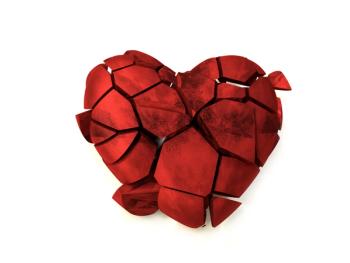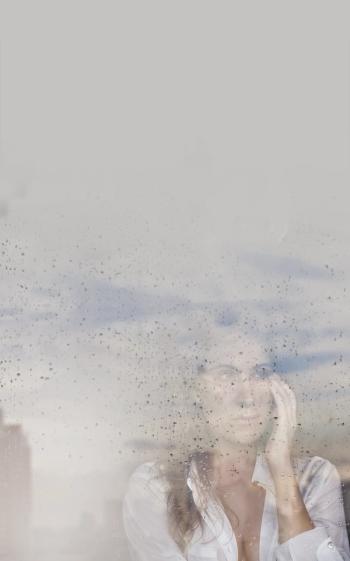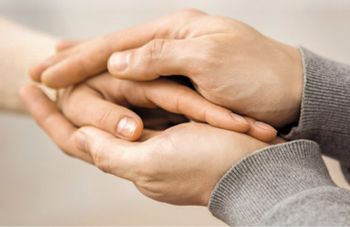
Simple Tasks
Presenting the second-prize winner of the 2022 Gerald F. Berlin Creative Writing Award.
The following is “Simple Tasks,” second-prize winner of the 2022 Gerald F. Berlin Creative Writing Award, introduced by a brief note from the author. The Gerald F. Berlin award recognizes exceptional prose and poetry written by medical, nursing, and doctoral students; residents; and fellows. To learn more about the award, see “
I wrote this piece on a whim one Saturday morning, partially to procrastinate my studying for a few more hours, but mostly to articulate the complex range of emotions I had been experiencing over the course of a year. It flowed out of me in less than 45 minutes. I have come to see the practice of writing as a way of processing and healing from the many challenges that arise in medical school (and outside of medical school), while also honoring the celebrations. I was motivated to submit this essay for the Berlin prize after the piece was published on a UMass community blog, and I received an incredible outpouring of praise and support from my peers with whom it resonated. This award honors not only the piece, but the authenticity of the experiences detailed therein, and I am deeply grateful to the Berlin family for this recognition.
Simple Tasks
“I would open it,” he snaps, staring intently at me. I’ve already grasped the door handle, but I suppose I hesitated a moment too long. The resident doesn’t take his eyes off me as I yank the door open and flatten myself behind it, making as much space as possible for him and the rest of the team to leave the room. The patient, a kind but chatty man, has been talking for 15 minutes, and we were only here to ask him a brief question. It’s well past noon, rounds have gone late, and it’s Friday: we’re all ready to leave.
As we walk back to the elevator, the resident educates me on “one of the best skills to develop as a med student”: the ability to sense when everyone wants to leave and open the door so that they can. “It’s because you guys are always in the back by the door. You need to relieve the obstruction.” He hurries past me to board the elevator, and I follow him in, taking my position in the back.
This is the second-to-last rotation of my third year of medical school. The curtain was pulled back for me long ago, revealing the extent of the illusion I was promised. That year of bold entry into the world of clinical medicine—filled with life-changing patient encounters, vibrant with educational opportunity—has turned out to be mostly moments like this: being made to do menial tasks, and being told I’m not doing them well enough. I’ve held doors, filed papers, cut suture strings, and printed lists for eight months. I’ve been referred to as “kid” or “the student” far more often than my name. I’ve been ignored, infantilized, and demeaned. Month after month, rotation after rotation, this year has often felt like death by a thousand cuts.
And yet, this year has also been transformative. I have delivered babies. I have stood through 6-hour surgeries, sidelining all my bodily needs for longer than I ever have. I have watched as a neurosurgeon pulled fourteen nails out of the head of a man my own age, a man who shot those nails himself in a desperate attempt to silence the voices he couldn’t stop hearing. I have sat for hours with a patient deep in the throes of psychosis, as he pleaded with me to believe him that he was indeed reading the minds of everyone in the building and we were all in grave danger. I have made friends, lost friends, laughed, cried. I got engaged to my partner of four years, and I have felt love deepen in ways that still surprise me every day. I have learned and grown and changed, and yet some days I feel as though I am still where I was at the outset of this year: at the back of the room, at the bottom of the hierarchy, being told that the one thing I did was not done well.
I think it would surprise no one to hear that medicine, with all its selflessness and service, is a field plagued by cynicism and misdirected passive aggression. Healthcare worker burnout is at an all-time high. Now rounding into its third year, the COVID pandemic has left the medical world downtrodden. And I think it would surprise no one to also hear that in an environment where tensions run high and fuses are short, these frustrations are often let out on the most junior person in the room. Part of me understands it. Two years in the classroom (especially a virtual one) is ill preparation for navigating the hospital ecosystem, and so often it takes twenty minutes to teach us how to do something that an experienced intern could do themselves in five. And I’ve met and worked with so many incredible teachers and colleagues this year. But, for all the good there is in this year, it doesn’t make the bad any easier to endure.
How do we approach a problem so pervasive? A permanent solution seems unlikely to appear, at least while I am still in medical school. Our current grading system—one that places great emphasis on our seniors’ subjective evaluations of our skill and professionalism—keeps us firmly held in the lower end of the power dynamic. Should we swear to ourselves that we will never treat our students this way? Should we let ourselves grow jaded and cynical? Should we continue to go into the hospital, putting on a brave front day after day, and save our feelings of inadequacy and frustration for our loved ones, in tearful conversations and inconsolable moments? I’ve tried all of the above, but none seem to work quite as well as I’d like.
While no permanent solution may exist, I do offer one that I have found most sustainable—one for which the simple tasks of the third-year med student have prepared me well. It is a solution that I am reminded of that same day, in the next patient’s room. We step off the elevator into the emergency department, and fan around a small bed currently occupied by a man in his nineties. It is impossible to look at him and not notice the length of his ears. When he recounts his story of the fall that brought him here, he has an undeniably spry wit that makes me smile beneath my mask. Though he wears the same johnny and yellow socks with fall-proof rubbered bottoms as every patient in the hospital, he still has his own slippers on, a glimmer of the identity that he has mostly been stripped of here. I recognize these slippers. They’re LL Bean moccasins. I have a pair that looks almost exactly the same, given to me by my fiancé last Christmas. When the attending removes them to test the man’s Achilles reflexes, she leaves them at the foot of his bed. I know these slippers; I love how comfortable they are, how warm they keep my feet, how they help me get out of bed on the coldest of mornings. If I were in this place, this unfamiliar territory of beeping machines and crowded hallways and the constant shouting of another patient down the hall, I would cling to these slippers and the small comfort they provide as much as I could.
I think of another kind of moment I have witnessed over and over again this year. I remember the resident who held the hand of an elderly woman as she began to cry, filled with the mortal terror of the cancer diagnosis she’d received just yesterday. I remember the scrub tech who followed me out of the hospital on my last day of surgery, after I’d left before he had the opportunity to say goodbye, just so he could shake my hand and wish me all the best. I remember my classmate kneeling in front of her co-student, who has nearly fainted from exhaustion, as she peels the lid off a cup of apple juice for her. If death comes by a thousand cuts, resilience is made in a thousand acts of kindness.
It is in these little moments that we are reminded of the humanity we all share, of the reason we all answered the call of medicine in the first place. I twist the engagement ring on my finger. It’s like falling in love: it doesn’t take the pain of the world away, but rather gives you the strength to go on despite it. Kindness is a pair of slippers for the soul.
As the team files out of the room, I stop at the foot of the bed. “Would you like me to put your slippers back on?” I ask the man.
“Yes, please,” he smiles, “if you don’t mind.”
I pick up each moccasin, gently sliding them on one foot at a time, and wish him a good day before I run after my team down the hall.
Mr Boyden is an MD candidate, class of 2023, at the University of Massachusetts Medical School.
Newsletter
Receive trusted psychiatric news, expert analysis, and clinical insights — subscribe today to support your practice and your patients.






